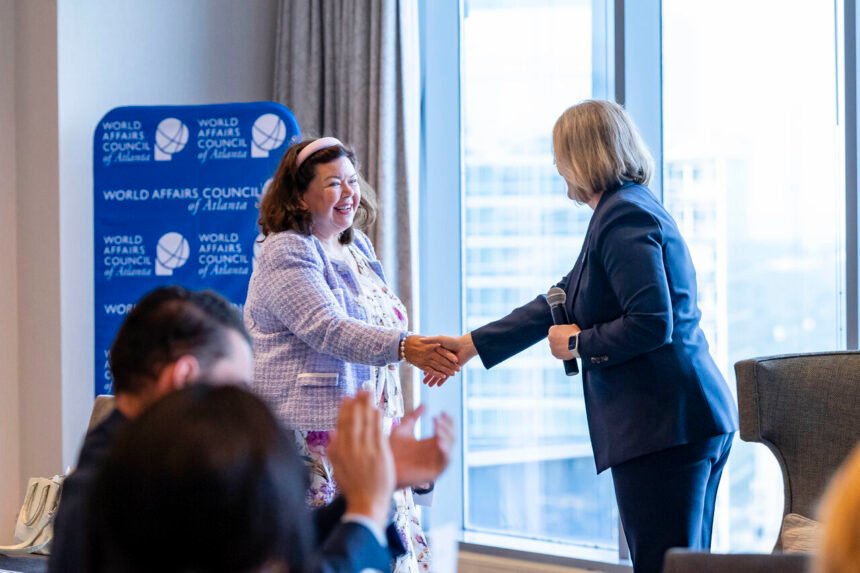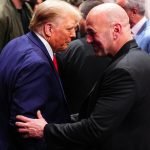As economic and security issues become increasingly intertwined, the United Kingdom is stepping up collaboration with the U.S. on artificial intelligence and other critical technologies, the British envoy to Washington said Thursday in Atlanta.
During a World Affairs Council of Atlanta keynote breakfast briefing, Ambassador Karen Pierce said AI might end up being as consequential for the world as nuclear technology was in the 1950s.
“But of course, in the 1950s, nobody on a sofa and a laptop, thankfully, could make an atomic bomb. But now we do need to look at this afresh. I don’t think there are many precedents for what we now have to get to,” she said.
Their joint approach on AI is emblematic of how the partners are “creating common frameworks for the new challenges of the 21st century,” the ambassador said.
Setting global ethical standards and ensuring the West’s pre-eminence over China and other authoritarian regimes when it comes to military applications is imperative, she said, emphasizing the critical role of the private sector will play in addressing the threats and capitalizing on opportunities of a technology often viewed as somewhere between disruptive and transformative.
The U.K. is opening the first U.S. office of its AI Safety Institute in San Francisco, welcoming participation from American tech companies that will shape the sector’s future.
“Clearly, at a time when anyone with a spare room … can contribute to the development of AI, it’s not going to work just to have government-imposed regulation.”
As with many global issues, the U.K. is aiming to support U.S. leadership in the sector while asserting its own strengths as what she called the “third largest AI sector in the world” behind the U.S. and China.
“As (the U.S. goes) out, as you have leadership in the world, we see our job as supporting that, but also burden-sharing,” Ms. Pierce said, noting that the U.K. is the “only one of America’s allies who can do a smaller version of what America does across the world.”
But she also acknowledged that the rich world should understand valid fears around emerging technology espoused by the “new kids on the block” — rapidly developing countries with large populations and strong economies that are already questioning the fitness of the Western-led order to govern a modern, multipolar world.
“I think we also underestimate how difficult it is for some countries to get to grips with the enormity of something like AI from a governmental public policy perspective,” she said.
The United Nations, she added, could become an inclusive venue for instituting new standards.
AI is just one sector in which transatlantic cooperation has become more vital, Ms. Pierce said, with the U.K. taking trade issues into its own hands since Brexit was enacted in 2020, freeing up the country to pursue its own policies.
While awaiting friendlier talks with the U.S. on a bilateral trade agreement, the U.K. has signed six state-level pacts focused on acute industries or initiatives, such as wind energy in North Carolina and automotive and life sciences in South Carolina.
On security and defense, the U.S. and U.K. have worked hand in hand on Ukraine, and while they’ve diverged on the embargo of certain arms sales to Israel amid the war in Gaza, Ms. Pierce said the latter issue is more about the countries’ respective obligations under international humanitarian law than fundamental disagreements with the Biden administration how to effect a ceasefire.
“We want to ceasefire as soon as possible. We want the hostages out. We are very ready to support America in any way we can. I think Secretary (Antony) Blinken has been doing astounding work, good work, to try and get that ceasefire and get the hostages out. And we need much more aid to go into Gaza,” Ms. Pierce said in an interview with council President Rickey Bevington.
She also addressed AUKUS, the three-year-old agreement on the sharing of nuclear submarine (not weapons, she stressed) technology among the U.S., U.K. and Australia, is another example of unprecedented cooperation by allies to address new geopolitical challenges.
“It’s a groundbreaking trilateral attempt to bring more security and stability to the Indo-Pacific. It will consist eventually of a brand new design for a submarine that will be built in Australia, with help from America and from Britain, with our nuclear specialists,” Ms. Pierce said.
She characterized the deal as the first time allies have shared such sensitive tech since the 1950s and framed it as a response to the threat posed by China. That country, she said, has been engaged in economic coercion with Australia and other parties in the region, as well as expanding its influence and ramping up aggressive actions in the South China Sea. The British Navy last year sent a carrier strike group through the Taiwan Strait to support the U.S. efforts to uphold the right to freedom of navigation in international waters, she added.
In the spirit of AUKUS, the U.S. last month lifted certain export controls and restrictions on technology transfer for British and Australian companies in its International Traffic in Arms Regulations, or ITAR, a step reciprocated by these countries’ respective bodies.
“It sounds like a very small step, but it’s actually taken us decades to negotiate, and if you have a business in that area, it will be transformative,” Ms. Pierce said.
On China, she said, the U.S. and U.K. align on security issues and human rights, especially in the case of China’s oppression of its Uighur minority group.
Where the allies diverge slightly is on the trade side, where the U.S. has pushed measures like tariffs aiming to rectify Chinese “overcapacity” in industries like steel and electric vehicles. The U.S. frames these issues in national security terms, but some trading partners have seen them as unnecessarily broad and protectionist.
“We probably have a more participatory relationship with China in terms of investment, in terms of trade,” Ms. Pierce said. “And we don’t always agree with where America would draw the line, but we would share your concerns about Chinese investment in critical infrastructure.”
While they don’t always share the same views at the World Trade Organization, the U.K. appreciates the broader framework espoused by the U.S. when it comes to China — contest and compete where necessary but cooperate where possible.
Ms. Pierce, who has worked in her four years in Washington under three different leaders including Prime Minister Keir Starmer‘s new Labour government, said the vaunted “Special Relationship” doesn’t preclude disagreements, but constant dialogue ensures it’s “very rare that any single issue disrupts it.”
That’s partially because the two sides have such a strong economic partnership to match their historical amity.
About $2.5 trillion invested bilaterally over time supports some 2.7 million jobs across both countries, according to the White House, which in June 2023 announced a new partnership with the U.K. that included a focus critical technologies like quantum computing, synthetic biology, semiconductors, and, of course, artificial intelligence.
—
Learn more about the World Affairs Council of Atlanta and become a member here.
Contact the British Consulate General in Atlanta here or learn more about doing business with the U.K. from the British-American Business Council of Georgia.











